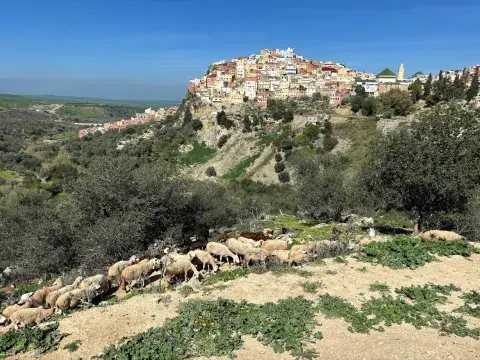
Student Reflections: Sustainable Practices on my AT
A topic that is often overlooked in the whirlwind of travel excitement is that of sustainability: while we’re all spirited about selecting and even organising our academic travel classes every semester, it’s easy to overlook the environmental and social impact of our trips. However, with the increasing number of conversations being had about ecotourism and sustainable travel, traveling itself can feel almost paradoxical: we want to see the world, but sometimes our very presence can severely harm the places we visit. This manifests in ways such as plastic waste generated during our travels and the carbon footprint left by our flights.
In a globalized world, and one that is continually evolving technologically, long-distance travel is not something that is going to disappear any time soon, thus it is important to be mindful of our travel practices. While this might require a bit more planning and effort, the benefits are valuable not only for us, but for the generations to come after us and for the communities we leave behind when our trips come to an end. By choosing eco-friendly accommodations, supporting local businesses, and respecting cultural traditions, to name a few, we can make a positive difference in the places we visit.
This spring, the academic travel class CLCS 251T to Morocco led by Professor Patrick Saveau depicted some ways in which travel can be done sustainably. While in Morocco, not only did our meal options have a great selection of vegetarian options, but the majority of our meals were made from locally sourced ingredients, especially when we would dine in the homes of friends of the professor. We were privileged to be able to visit many cities in Morocco, and the choice of traveling by bus, rather than flying into the airports of the cities that we were traveling to, also greatly reduced our carbon footprint. Additionally, on these bus rides, we were able to admire the beauty of the natural environments in Morocco, creating a great sense of appreciation and admiration for the land.
One of the days of our travel was dedicated to a hike in Moulay Idriss, hosted by a member of IFKER, an association promoting environmental education and sustainable development. On this hike, we were given a tour of part of the region, learning about the roles water usage, conservation, and crop rotation play in that community, and the effects climate change has had on them. It was enlightening to learn about how generational information is passed down in the community regarding sustainability and respect for the environment, as well as how contemporary issues play into the discourse surrounding it.
During this hike, Professor Saveau also talked to us about the role that we play in being complicit in the perpetuation of certain aspects of the meat industry. He talked to us about the disconnect that often exists in our minds between the animals we see around us and the meat on our plates. This disconnect can in particular make us reluctant to pursue more sustainable eating practices, as we tend to ignore the role that eating meat has on the environment. This talk was not meant to be accusatory, but instead to challenge us to think differently about what we eat and how it affects the world around us. It also explored the idea that eating more sustainably does not only mean increasing plant-based diets, but also buying from local farms and using all parts of an animal when eating meat.
Overall, the travel was multifaced regarding ways in which we interacted with Morocco, not just in the sense of culture and travel, but also in the scope of sustainability. Going to a university where international travel is an integral part of the school’s experience can make us, who desire to live more environmentally consciously, weary and even guilty about our travels, especially those covering greater distances. Nonetheless, there is a sweet spot where we can satisfy our wanderlust, while also being mindful of our ecological and social impact. Discussing these issues contributes to positive change in our actions, as seen in the steps various professors and courses have taken towards reducing our carbon footprints while traveling, and further develops the enriching, multi-disciplinary nature of many of the topics students at Franklin are able to explore through Academic Travel, which can be found in both Academic Travel classes that are overtly focused on sustainability, like ENV ones or even Professor Conte's Slow Travel course, and in ones you may not have expected the topic to come up in!
By Christie Gichuhi

